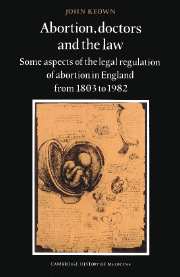 Abortion, Doctors and the Law
Abortion, Doctors and the Law Published online by Cambridge University Press: 26 October 2009
This final chapter outlines some of the general conclusions of the book and suggests a possible perspective from which to view the aspects of the development and operation of the law relating to abortion which it has considered.
Chapters 1 and 2 suggested that the emerging medical profession exerted an influence upon the gradual statutory restriction of the law against abortion between 1803 and 1861. Chapter 4 traced its support for, and shaping of, the Abortion Act 1967, and Chapter 6 its persistent defence from subsequent legislative restriction of the broad medical discretion afforded by the Act to doctors.
It appears that a central (though not exclusive) concern of the profession in both the restriction of the law in the nineteenth century and its relaxation in 1967 has been self-interest. As the British Medical Journal has noted, two central concerns of the profession are freedom from control and the prevention of encroachment upon its sphere of influence by the medically unqualified. This book provides some evidence that both of these concerns have been prominent in the development and operation of the laws relating to abortion from 1803 to 1982. In 1967, the profession supported the passage of an Act whose central declared aim was the abolition of ‘back-street’ abortion – an aim which was to be achieved by granting registered medical practitioners a legal monopoly on the induction of abortion. It also supported the restriction of the abortion law in the nineteenth century – a reform which may also have served the interests of the profession by penalising the performance of abortion by irregular practitioners.
To save this book to your Kindle, first ensure [email protected] is added to your Approved Personal Document E-mail List under your Personal Document Settings on the Manage Your Content and Devices page of your Amazon account. Then enter the ‘name’ part of your Kindle email address below. Find out more about saving to your Kindle.
Note you can select to save to either the @free.kindle.com or @kindle.com variations. ‘@free.kindle.com’ emails are free but can only be saved to your device when it is connected to wi-fi. ‘@kindle.com’ emails can be delivered even when you are not connected to wi-fi, but note that service fees apply.
Find out more about the Kindle Personal Document Service.
To save content items to your account, please confirm that you agree to abide by our usage policies. If this is the first time you use this feature, you will be asked to authorise Cambridge Core to connect with your account. Find out more about saving content to Dropbox.
To save content items to your account, please confirm that you agree to abide by our usage policies. If this is the first time you use this feature, you will be asked to authorise Cambridge Core to connect with your account. Find out more about saving content to Google Drive.